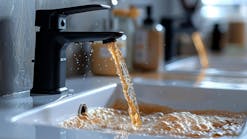Cranfield University & Warden Biomedia complete first phase of 3 yr research project
March 30, 2016
The UK's Cranfield University’s Water Sciences Institute has completed the first phase of a three year research project that evaluates the various aspects of the plastic media produced by UK manufacturer Warden Biomedia for wastewater treatment processes. The academic/industry collaboration is focusing on research and development of biofilm processes aiming to improve efficiency, cost-effectiveness and sustainability process units such as submerged aerated filters (SAFs), moving bed biofilm reactors (MBBR) and trickling filters.
The first phase, which was undertaken by PhD student Joana Manuel Silva under the supervision of Dr Ana Soares and Professor Tom Stephenson, was dedicated to investigating the impact of the media with different shapes, geometries and surface area on mixing and aeration efficiency in a 1 m3 pilot-plant using tracer tests and oxygen transfer efficiency tests, respectively. The findings have highlighted significantly different efficiencies depending on the media characteristics, which will now be fed into Warden’s product development.
Says Warden’s managing director, Mark Barrett, “It's early days, but this will help us develop alternative design approaches for the next generation of biofilm processes. Energy in wastewater treatment can be up to 50-60 percent of the operational costs, so investigating the impact of different media on aeration is very important, enabling us to help our clients to estimate and potentially decrease energy consumption.”
The next phase of the project, which starts this month and ending in early 2017, will now focus on the investigation of the impact of the different media on the process start-up, performance, effluent quality and specific microbial communities development, in the pilot-plant using real municipal wastewater.
Ends.
For further information, contact:
[email protected] Tel: 01525 633836/07717 327 302
[email protected] Tel: +44 (0) 1582 573 030
Notes to Editors:
Warden Biomedia specialise in the research and development of random filter media for aeration and biological treatment plants. With the philosophy of increased surface area, the eco-friendly biological filter media are injection-moulded in recycled polypropylene with specific design features to increase the efficiency of the effluent treatment process. Based in Luton, Bedfordshire, UK they are part of the Warden Group
Cranfield Water Science Institute (CWSI) has an international reputation and 40 year history for its transformational research and teaching in the science, engineering and management of water in the municipal, industrial and natural environments. Academic and research staff, including scientists, engineers, technologists, policy specialists and social scientists are engaged in delivering postgraduate teaching, research, consultancy and training in an international arena. The Institute is based in Bedfordshire, UK>
The first phase, which was undertaken by PhD student Joana Manuel Silva under the supervision of Dr Ana Soares and Professor Tom Stephenson, was dedicated to investigating the impact of the media with different shapes, geometries and surface area on mixing and aeration efficiency in a 1 m3 pilot-plant using tracer tests and oxygen transfer efficiency tests, respectively. The findings have highlighted significantly different efficiencies depending on the media characteristics, which will now be fed into Warden’s product development.
Says Warden’s managing director, Mark Barrett, “It's early days, but this will help us develop alternative design approaches for the next generation of biofilm processes. Energy in wastewater treatment can be up to 50-60 percent of the operational costs, so investigating the impact of different media on aeration is very important, enabling us to help our clients to estimate and potentially decrease energy consumption.”
The next phase of the project, which starts this month and ending in early 2017, will now focus on the investigation of the impact of the different media on the process start-up, performance, effluent quality and specific microbial communities development, in the pilot-plant using real municipal wastewater.
Ends.
For further information, contact:
[email protected] Tel: 01525 633836/07717 327 302
[email protected] Tel: +44 (0) 1582 573 030
Notes to Editors:
Warden Biomedia specialise in the research and development of random filter media for aeration and biological treatment plants. With the philosophy of increased surface area, the eco-friendly biological filter media are injection-moulded in recycled polypropylene with specific design features to increase the efficiency of the effluent treatment process. Based in Luton, Bedfordshire, UK they are part of the Warden Group
Cranfield Water Science Institute (CWSI) has an international reputation and 40 year history for its transformational research and teaching in the science, engineering and management of water in the municipal, industrial and natural environments. Academic and research staff, including scientists, engineers, technologists, policy specialists and social scientists are engaged in delivering postgraduate teaching, research, consultancy and training in an international arena. The Institute is based in Bedfordshire, UK>
Contact:
[email protected] Tel: +44 (0) 1525 633836/07717 327 302[email protected] Tel: +44 (0) 1582 573 030


